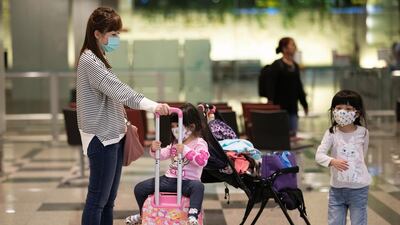On Monday, the UAE announced tighter restrictions on Chinese tourists entering the country, suspending all flights to and from China, with the exception of the country’s capital, Beijing.
The move was intended to contain coronavirus cases in the country. The Wuhan virus has infected more than 20,000 people in China and killed at least 425.
The UAE has five cases of coronavirus – all Chinese tourists on holiday in the UAE.
Strict checks are in place at UAE airports to assess the medical condition of passengers coming from China.
Beijing now requires passengers to undergo comprehensive medical screening before boarding a plane that can last six to eight hours.
Doctors across the UAE also received guidelines to follow if they suspect a patient has coronavirus.
With the stricter measures in place, several questions arise. How does it work? Are screenings handled in secure rooms? Will I be screened? What to expect at airport screenings?
The National explains.
What are the symptoms of the virus?
According to a circular issued by health authorities in the UAE, symptoms include a cough, shortness of breath, fever, sore throat and a headache.
A study conducted on 99 patients, published in The Lancet journal on January 30, said the most common symptom was fever, which was diagnosed in 83 per cent of cases, followed by cough in 82 per cent of the cases.
Less common symptoms include a shortness of breath, muscle ache, confusion, headache, sore throat, runny nose, chest pain, diarrhoea, nausea and vomiting.
Dr Sreehari Pillai, medical administrator and internal medicine specialist at NMC Speciality Hospital in Abu Dhabi, said health authorities had advised doctors on how to conduct a physical examination if the suspected a case of coronavirus.
Are screenings handled in secure rooms?
Dr Pillai says patients who may be infected with the virus are immediately taken to a negative pressure room, which has lower air pressure than normal.
The system allows air to flow into the room but not out, as air naturally flows from areas of high to low pressure. This prevents the spread of germs outside the room.
Hospitals are required to have this room ready to assess and treat coronavirus cases under guidance from authorities.
The patient is quarantined here and only authorised staff members are permitted entry into the room.
What happens if a patient is admitted?
Swabs are taken from a patient's nose and throat. The samples are sealed in a container and taken to a central facility for testing.
In Abu Dhabi, the samples are tested at the Sheikh Khalifa Medical City microbiology laboratory and in Dubai, to the government-run Latifa Hospital.
All samples are electronically tagged and the results are updated in a central database that can be accessed by medical providers, including the hospital treating the patient.
How long has this system been in place?
This system has been in place for more than two weeks now.
"The health authority circulated the guidelines to follow on January 20," Dr Pillai said.
“All healthcare institutions were required to train their staff and report on their preparedness to ensure they had personal protection equipment and isolation rooms ready. So everything was already in place,” he said.
What if a passenger is flying to the UAE?
Procedures are in place to screen passengers at airports in the UAE. On Monday, the country announced it would join several other countries in suspending flights to and from China, with the exception of Beijing, in the case of the Emirates airlines.
Any passenger arriving on a direct flight from China is required to pass through thermal scanners. They are also provided with guidebooks and health tips.
Passengers flying to the UAE from Beijing must undergo a comprehensive medical screening before they board the aircraft. The procedure can take six to eight hours.
The UAE's General Civil Aviation Authority, an agency that oversees civil aviation in the country, said this was to contain the virus.
The GCAA did not elaborate on the extra checks for passengers boarding flights in Beijing.
Screening tests in other countries include checking the temperature of passengers. Airport staff monitor passengers for a few hours to look for other symptoms like coughing.
Passengers may also be asked to fill out a questionnaire detailing their symptoms, travel and contact information, as required by border control in the United States.


